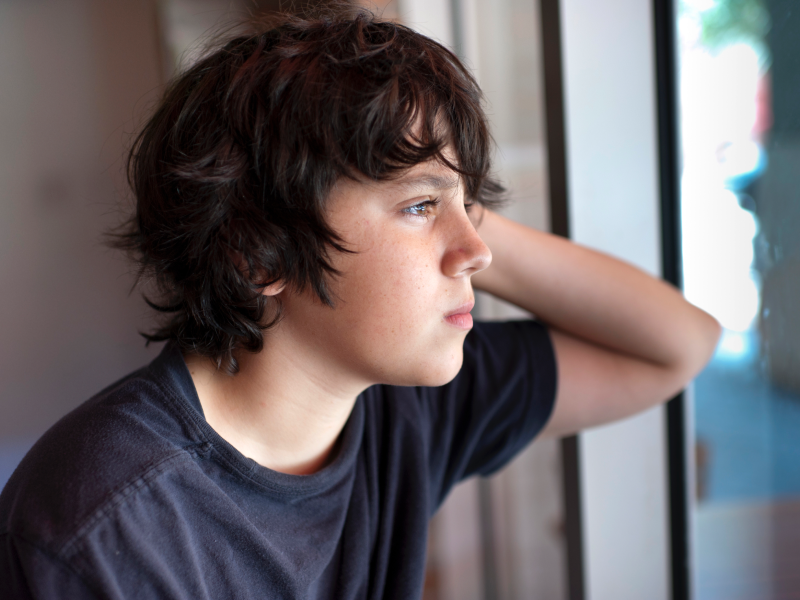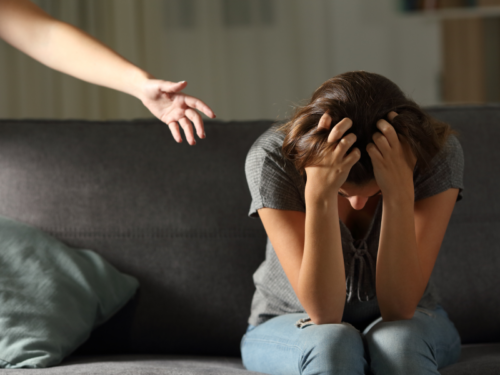
Table of Contents
OCD vs Anxiety Disorders

Written By: Sarah Fielding

Clinically Reviewed By: Dr. Don Gasparini
April 20, 2023
5 min.
OCD is characterized by obsessions and compulsions, while anxiety disorders stem from anxious thoughts.
Learn more about our Clinical Review Process
Table of Contents
Anxiety is a common symptom of mental health conditions, so it’s easy to think that a young person experiencing it has an anxiety disorder. Though possible, many conditions, notably obsessive-compulsive disorder (OCD), can cause anxiety but don’t fall into this category. So what is the difference between OCD vs. anxiety disorders?
The differences between OCD and anxiety disorders
OCD is a condition in which people experience unwanted and intrusive thoughts — or obsessions. The obsessions then lead to compulsions — an urge to satisfy the preoccupation. Sometimes, a teen may only experience obsessions, but compulsions are much more common. According to the International OCD Foundation, OCD typically manifests in young people between ages 8 and 12 or from late adolescence to young adulthood. An estimated 500,000 children and adolescents live with OCD.
In contrast to obsessive thoughts, anxiety disorders are characterized by persistent, noticeable anxiety.
While OCD is a single condition, albeit presenting differently from person to person, there are a few anxiety disorders. According to the National Institute of Mental Health, the most common anxiety disorders include:
- Generalized anxiety disorder: Characterized by consistent feelings of anxiety or dread coupled with symptoms like fatigue and restlessness.
- Panic disorder: The core symptom is a panic attack, which can lead to chest pains, heart pounding, and a sense of impending doom, and might occur even when there’s no apparent source of stress. Experiencing a panic attack doesn’t mean a person has a panic disorder. A person with this disorder will likely fixate on when their next panic attack will occur, avoid sources — from places to activities — that previously triggered one, and experience them between yearly to daily.
- Social anxiety disorder: A fear of others watching or judging them and attempts to avoid public situations. A person might feel self-conscious, speak softly, sweat, or avoid eye contact with others.
- Phobias: These can be anything from severe anxiety about flying or spiders to the previously mentioned social anxiety disorder (formerly known as social phobia), in which a person fears being judged for their anxiety-fuelled tendencies.
- Separation anxiety disorder: People with this disorder will feel immense anxiety when apart from a loved one and might fear something terrible happening to that person.
Join the Charlie Health Library
Get mental health updates, research, insights, and resources directly to your inbox.
You can unsubscribe anytime.
Can OCD be classified as an anxiety disorder?
The Diagnostic and Statistical Manual of Mental Disorders (DSM), a prominent guide to diagnosing conditions, previously classified OCD as a type of anxiety disorder. However, OCD was placed into its own category titled ‘Obsessive-Compulsive and Related Conditions’ when the DSM’s fifth edition was published in 2013. ‘Related conditions’ include body dysmorphic disorder, skin picking disorder, hoarding disorder, and trichotillomania. A new classification was introduced to distinguish between OCD and other disorders, emphasizing that the presence of obsessions and compulsions (as opposed to anxiety) constitutes the primary underlying factors in these conditions. Experiencing obsessions and compulsions can cause anxiety, but it isn’t the initial symptom.

How can you tell if you have OCD or an anxiety disorder?
Mental health conditions can have overlapping symptoms and co-occur in the same person. To obtain an accurate diagnosis, it is essential to discuss your symptoms and concerns with a qualified mental health professional who can assess your condition and determine whether you are experiencing OCD, an anxiety disorder, or another mental health condition.
Symptoms that overlap between both anxiety disorders and OCD include phobias, such as spending time socializing and germs. Fear of judgment, uncertain situations, and inability to control their own behavior are additional signs, with anxiety typically experienced by everyone with OCD or an anxiety disorder in some manner.
However, most symptoms are unique to individual disorders.
OCD symptoms include:
- Fear of misplacing or forgetting something
- Intrusive thoughts
- Concern over
- Arranging items in a specific manner
- Hoarding
- Regularly checking to confirm things, such as that a door is locked
As briefly touched on before, anxiety disorder symptoms include:
- Fatigue
- Body aches
- Sweating
- Severe worrying
- Irritability
Do you need more support with
your mental health?
Charlie Health can help.
How support options for OCD and anxiety disorders compare
Treatment for OCD is relatively similar to anxiety disorders. Standard options include therapy, medication, and lifestyle changes.
Let’s start with therapy for OCD vs. therapy for anxiety disorders. As is the case for unique anxiety disorders, overall themes in treatment may align but are tailored to the specific condition and person.
Cognitive behavioral therapy
Cognitive behavioral therapy (CBT) is highly recommended for both OCD and anxiety disorders. CBT is a form of talk therapy designed to assist individuals in recognizing and acknowledging negative thoughts and behaviors. It then works on reframing these and acting in ways that promote healing and better mental health. It’s available in individual therapy and group session settings. In addition to these OCD and anxiety disorders, CBT is commonly utilized for people with depression and substance use disorders.
Exposure and response prevention therapy
Exposure and response prevention (ERP) therapy is a type of CBT that is often used to treat OCD). ERP therapy involves gradually exposing a person with OCD to the feared object or situation that triggers their obsessions while simultaneously preventing them from engaging in their typical compulsive behaviors.
The goal of ERP therapy is to help the person with OCD learn to tolerate the anxiety and discomfort triggered by their obsessions without resorting to compulsive behaviors to relieve their distress. Through repeated exposure to their fears, the person with OCD gradually learns that their fears are irrational and that they can resist the urge to perform compulsive behaviors.
Medications
Selective serotonin reuptake inhibitors (SSRIs), commonly referred to as antidepressants, can support people living with OCD or anxiety disorders. They work by balancing the neurotransmitters and chemicals in a person’s brain, generally taking six to 12 weeks to reach full effectiveness. The FDA has approved SSRIs fluoxetine, sertraline, fluvoxamine, and clomipramine for people under 18.
Anti-anxiety medication, known as benzodiazepines, might also be given to people with an anxiety disorder.
On the lifestyle front, quite a few habits have been shown to benefit people with OCD and anxiety disorders. These include staying active, getting consistent sleep, maintaining healthy relationships with loved ones, and reducing stress in areas of your life when possible.
Do you need more support with
your mental health?
Charlie Health can help.
How Charlie Health Can Help
Charlie Health’s virtual Intensive Outpatient Program (IOP) supports people experiencing OCD and anxiety disorders. They can also aid in determining which mental health condition you are experiencing. Connect with a professional here.





